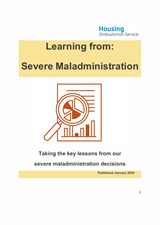Learning from Severe Maladministration: Lessons from the Housing Ombudsman Service

This report by the Housing Ombudsman focuses on adaptations and landlords’ responses to mental and physical health needs. It is based on 35 investigations where residents have asked for an adaptation to the home or service adjustment. Adaptations include those to facilities like kitchens or bathrooms or service changes because of vulnerabilities.
The report examines how landlords have managed adaptations, including liaising with Occupational Health, communication with residents and making reasonable adjustments under the Equality Act. It found that systems and processes were repeatedly exposed through their investigations, delivering poor outcomes for residents, impacting not only on their physical health but also their mental health and wellbeing. Furthermore, it observed:
- that etched across these cases is a lack of resources, compounded by homes designed in a different era that can be less practicable and more expensive to adapt
- some homes were let when the landlord knew it would not meet the resident’s needs but addressing this can be delayed and, at the other end of the process, adaptions being cancelled because the landlord opts to move the resident but that does not happen.
- adaptations to kitchens and bathrooms were mishandled and delayed, with residents unable to cook or bathe adequately
- issues relating to Disabled Facilities Grants and Decent Homes Standard requirements for replacing bathrooms and kitchens
- there was poor, inconsistent communication with residents and a need for better links with Occupational Therapy services
- a more coherent system would also future proof existing homes for the needs of tomorrow’s residents, offering a more efficient use of stretched resources.
The report provides examples of severe maladministration, drawing on the findings from specific investigations and it pulls these together with a series of recommendations for social landlords, offering practical lessons and learning on adaptations to help shape their policies, practices and procedures.
If you found this of interest, check out the Housing LIN’s dedicated page on the role of Occupational Therapists in Housing and their input into the design of new homes and adapting existing stock.
